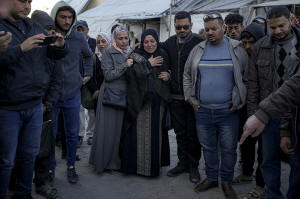A baby froze to death overnight in Gaza as Israel and Hamas trade
accusations of ceasefire delays
 Send a link to a friend
Send a link to a friend
 [December 26, 2024]
By SAM MEDNICK, TIA GOLDENBERG and FATMA KHALED [December 26, 2024]
By SAM MEDNICK, TIA GOLDENBERG and FATMA KHALED
JERUSALEM (AP) — A baby girl froze to death overnight in Gaza, while
Israel and Hamas accused each other of complicating ceasefire efforts
that could wind down the 14-month war.
The 3-week old baby was the third to die from the cold in Gaza's tent
camps in recent days, doctors said, deaths that underscore the squalid
conditions, with hundreds of thousands of Palestinians crammed into
often ramshackle tents after fleeing Israeli offensives.
Israel’s bombardment and ground invasion of Gaza has killed over 45,000
Palestinians, more than half of them women and children, according to
Gaza’s Health Ministry, which does not distinguish between fighters and
civilians in its count.
The offensive has caused widespread destruction and displaced some 90%
of Gaza’s 2.3 million people, often multiple times. Hundreds of
thousands are packed into tent camps along the coast as the cold, wet
winter sets in. Aid groups have struggled to deliver food and supplies
and say there are shortages of blankets, warm clothing and firewood.
Israel has increased the amount of aid it allows into the territory,
reaching an average of 130 trucks a day so far this month, up from
around 70 a day in October and November. Still, the amount remains well
below than previous months and the United Nations says it is unable to
distribute more than half the aid because Israeli forces deny permission
to move within Gaza or because of rampant lawlessness and theft from
trucks.

The father of 3-week-old Sila, Mahmoud al-Faseeh, wrapped her in a
blanket to try and keep her warm in their tent in the Muwasi area
outside the town of Khan Younis, but it wasn't enough, he told The
Associated Press.
He said the tent was not sealed from the wind and the ground was cold,
as temperatures on Tuesday night dropped to 9 degrees Celsius (48
degrees Fahrenheit.) Muwasi is a desolate area of dunes and farmland on
Gaza’s Mediterranean coast.
“It was very cold overnight and as adults we couldn’t even take it. We
couldn’t stay warm,” he said. Sila woke up crying three times overnight
and in the morning they found her unresponsive, her body stiff.
“She was like wood,” said al-Faseeh. They rushed her to a field hospital
where doctors tried to revive her, but her lungs had already
deteriorated. Images of Sila taken by the AP showed the little girl with
purple lips, her pale skin blotchy.
Ahmed al-Farra, director of the children’s ward at Nasser Hospital in
Khan Younis, confirmed that the baby died of hypothermia. He said two
other babies — one 3 days old, the other a month old — had been brought
to the hospital over the past 48 hours after dying of hypothermia.
Ceasefire complications
Meanwhile, hopes for a ceasefire looked complicated Wednesday, with
Israel and the militant Hamas group that runs Gaza trading accusations
of delaying an agreement. In recent weeks, the two sides appeared to be
inching toward a deal that would bring home dozens of hostages held by
the militants in Gaza, but differences have emerged.
Although Israel and Hamas have expressed optimism that progress was
being made toward a deal, sticking points remain over the exchange of
hostages for Palestinian prisoners and the withdrawal of Israeli troops
from Gaza, people involved in the talks say.
On Wednesday, Hamas accused Israel of introducing new conditions related
to the withdrawal from Gaza, the prisoners and the return of displaced
people, which it said was delaying the deal.
Israel's government accused Hamas of reneging on understandings that
have already been reached.” Still, both sides said discussions are
ongoing.
Israel’s negotiating team, which includes members from its intelligence
agencies and the military, returned from Qatar on Tuesday evening for
internal consultations, following a week of what it called “significant
negotiations."
[to top of second column]
|

Palestinians react next to the bodies of their relatives who were
killed in the Israeli bombardment of the Gaza Strip at Al-Aqsa
Hospital in Deir Al-Balah, Wednesday, Dec. 25, 2024. (AP Photo/Abdel
Kareem Hana)

During its Oct. 7, 2023, attack on southern Israel, Hamas and other
groups took about 250 people hostages and brought them to Gaza. A
previous truce in November 2023 freed more than 100 hostages, while
others have been rescued or their remains have been recovered over
the past year.
Israel says about 100 hostages remain in Gaza — at least a third
whom it believes were killed during the Oct. 7 attack or died in
captivity.
Sporadic talks have taken place for a year, but in recent weeks
there's been a renewed push to reach a deal.
President-elect Donald Trump, who takes office next month for his
second term, has demanded the immediate release of Israeli hostages,
saying on social media that if they're not freed before he is sworn
in, there will be “HELL TO PAY.”
Families of the hostages are becoming increasingly angry, calling on
the Israeli government for a ceasefire before Trump is sworn in.
After Israel’s high-level negotiation team returned from Doha this
week, hostage families called an emergency press conference in Tel
Aviv, Israel, pleading for a ceasefire and a complete end to the
war.
Shir Siegel, the daughter of Israeli-American Keith Siegel, whose
mother was released after more than 50 days in captivity, said every
delay could endanger their lives. “There are moments when every
second is fateful, and this is one of those moments,” she said.
Families of the hostages marked the first night of Hannukah with a
candle lighting ceremony in Tel Aviv as well as by the Western Wall
in Jerusalem.
The agreement would take effect in phases and include a halt in
fighting, an exchange of Israeli hostages for Palestinian prisoners,
and a surge in aid to the besieged Gaza, according to Egyptian,
Hamas and American officials. The last phase would include the
release of any remaining hostages, an end to the war and talks on
reconstruction.
Houthi attacks
Also Wednesday, a missile launched by Yemen's Iran-backed Houthi
rebels triggered air raid sirens across central Israel, sending
residents fleeing to shelters. The Houthis said they operations were
aimed at Israeli targets in the cities of Jaffa and Ashkelon.
It was the fourth time in a week that fire from the Yemeni rebels
set off sirens in Israel.

Prime Minister Benjamin Netanyahu said Israel will strike anyone
threatening lives in Israel and warned the Houthis that they would
learn lessons that Hamas, Hezbollah and Syria's ousted President
Bashar Assad have learned.
Israel also requested an emergency meeting by the U.N. Security
Council to address the recent attacks. The meeting is set for
Monday.
Israel’s U.N. Ambassador Danny Danon said he expects the council to
condemn the Houthi attacks and called on it "to enforce
international law and hold Iran, the Houthis’ patron, accountable.”
___
Goldenberg reported from Tel Aviv, Israel, and Khaled from Cairo.
Associated Press writers Melanie Lidman in Tel Aviv, Lee Keith in
Cairo and Edith M. Lederer at the United Nations contributed to this
report.
All contents © copyright 2024 Associated Press. All rights reserved
 |